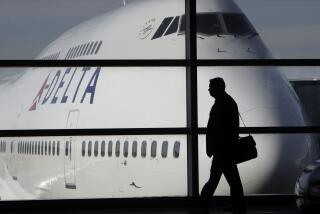Information to Give Airlines Added Thrust
- Share via
If you want to understand what is really happening in air travel today, don’t look to the old-fashioned labor-management battle between Eastern Airlines and its unions. Look to technology and global industry.
That’s where the future is, that’s where the money is. American Airlines recently sold a half interest in its Sabre computerized reservations system to Delta Airlines for $650 million. That’s more than Frank Lorenzo’s Texas Air Corp. paid to buy all of Eastern Airlines two years ago.
In fact, the total value of that reservation system, in which American and Delta are offering shares to foreign partners, might now go as high as $2 billion--which is a lot more than Eastern Airlines is worth today.
Welcome to the world of information as the driving force in business. It is a promising world, not a threatening one. But the dry words “computer reservation system” don’t begin to convey its far-reaching implications.
What is it? It’s a computer software system in which airlines enter data on everything from flight schedules and customer preferences to seat availability and equipment maintenance. If the tray table on seat 14C doesn’t work properly, the flight attendant can use the information system to alert a repair crew at the next landing. They can go directly to the seat and fix or replace the tray table. Wasted effort is avoided, costs are saved.
But the system is not an industrial speedup. It is a tool that reduces the frustration flight attendants, and passengers, would suffer if tray tables were not ready at the next airport, or if a repair request had to go through channels. The tool maximizes human effort.
And business capability. Airlines, using computer systems, can keep track of fares with increasing precision--charge less for early reservations, more to last-minute callers. They can catalogue customer preferences, give better service and make money more easily.
Why can information systems help airlines make more money? Because in a time when the government is no longer handing out lucrative monopoly routes, instantaneous information helps an airline be competitive.
Note: Competitiveness no longer comes just from paying less--the traditional cause of labor-management disputes. Airlines with computer systems can pay the same as other carriers but use people and equipment more efficiently.
Global Links
And it’s not a matter of charging the lowest fares. An airline can match fares for some seats, but sell others for more--and offer superior service. That’s a touchy subject, because airlines fell short on service in the post-deregulation scramble to cut fares. But lately, benefiting from computer efficiencies, major lines such as American and United have been making an effort to improve--and gaining a bigger share of the market.
Now they are linking up with overseas airlines. United owns 50% of the Apollo computer system, aviation’s second largest, with the other 50% split among USAir, British Airways, Swissair, KLM and Alitalia. American, with Delta as a partner in Sabre, is reportedly looking to take in Japan Air Lines and West Germany’s Lufthansa as partners, too.
Why are foreign airlines eager to come in? Profit, for one thing. Airlines, hotels and car renters pay fees for bookings; United’s Apollo took in $450 million last year.
More important are the efficiencies that offer foreign airlines the hope of survival in a deregulated, competitive world.
Ironically, Frank Lorenzo probably foresaw the growing power of information. One of the first things he did after acquiring Eastern was expand its System One computer reservation network to Texas Air. Now he’s trying to extend it to Europe. But System One is trailing other networks in development--and the Eastern bankruptcy adds a further shadow on its growth.
Lorenzo and his managers didn’t cause Eastern’s historic labor problems, but in the last two years they’ve added to them by their bullying tactics. Now they’re faced with union leaders shouting epithets, like cave men waving clubs at a world they never made.
Maybe Eastern’s problem is that no one there really understands the power of information.
More to Read
Sign up for The Wild
We’ll help you find the best places to hike, bike and run, as well as the perfect silent spots for meditation and yoga.
You may occasionally receive promotional content from the Los Angeles Times.






